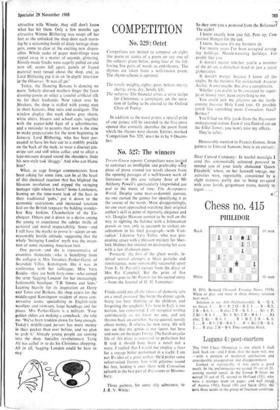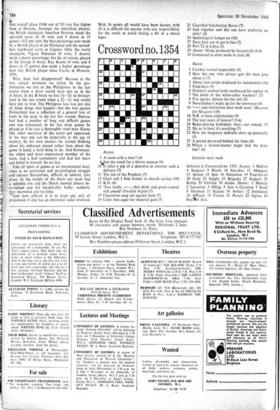Chess no. 415
PHILIDOR
Black 10 men 10 men
H. D'O. Bernard (Newark Evening News. 1933): White to play and mate in three moves; solution next week.
Solution to no. 414 (Velikoslayski): K - Q 1,
no threat. 1 B x P; 2 Q - R 2. 1 B - B 2; 2 B - B 6. 1 ... B else; 2 R - K 6. I ... Kt x P; 2 Kt - B 4. I ... Kt x Kt; 2 B - B 4. 1 . . . Kt else; 2 Kt - B 6. 1 . . . R - B 2; 2 R - K 6.
1 R - B 3; 2 B - B 4. I R x Kt; 2 R - K 1.
1 R else; 2 B - B 6. Fine complete block.
Lugano 4: post-mortem
The 1968 Chess Olympiad is one which I shall look back on—and I think that the team will, too —with a mixture of moderate satisfaction and considerable exasperation and disappointment.
Looked at statistically, it was quite a good result. In the preliminaries•we scored 19 out of 28, coming second equal; in the Group B finals we scored 33 out of 52, second to Holland (333). who were a stronger team on paper. and well aheat of Austria (303), Israel (30) and Spain (283), the next three teams in the group of fourteen countries.
Our overall place (16th out of 53) was five higher than at Havana. Amongst the individual players, the British champion, Jonathan Penrose, made the splendid score of 10 wins and 5 draws in 15 games-831 per cent; the best percentage ever made by a British player in an Olympiad and the second- best top-board score at Lugano. Only the world champion, Tigran Petrosian (9 wins, 3 draws), made a better percentage; but he, of course, played in the Group A finals. Ray Keene (9 wins and 8 draws in 17 games) also made a higher percentage than any British player since Clarke in Moscow, 1956.
Why, then, feel disappointed? Because at the two critical moments we failed. In the pre- liminaries we lost to the Philippines in the last round when a draw would have put us in the A finals; in the B finals we lost 14-24 to Switzer- land in the last round when a 21-14 win would have put us first. The Philippine loss was just one of those things that happen—but the loss against Switzerland was a reflection of a general loss of form in the team in the last few rounds. Penrose had had a number of long and difficult games and was exhausted; in his last three games he played as if he was a thoroughly tired man. Keene (the other mainstay of the team) got oppressed, in the way one can be (especially at the age of twenty), by his own success—he started thinking about his ,unbeaten record rather than about the game in hand, a fatal thing to dorAnd Kottnauer, the oldest and most experienced member of the team, had a bad tournament and had lost heart and belief in himself. So we lost.
Like all sport or games at an international level, chess is an emotional and psychological struggle and curious fluctuations, difficult to control, take place. In the middle of the finals our team had a splendid run and the Dutch seemed almost de- moralised and did inexplicably badly; suddenly they recovered and we tired.
"'And how difficult it is to keep any sort of proportion if one has an emotional stake involved. With 34 points all would have 33 it is difficult for anyone with for the result to avoid feeling leper. been heroes; with any responsibility a bit of a moral







































 Previous page
Previous page